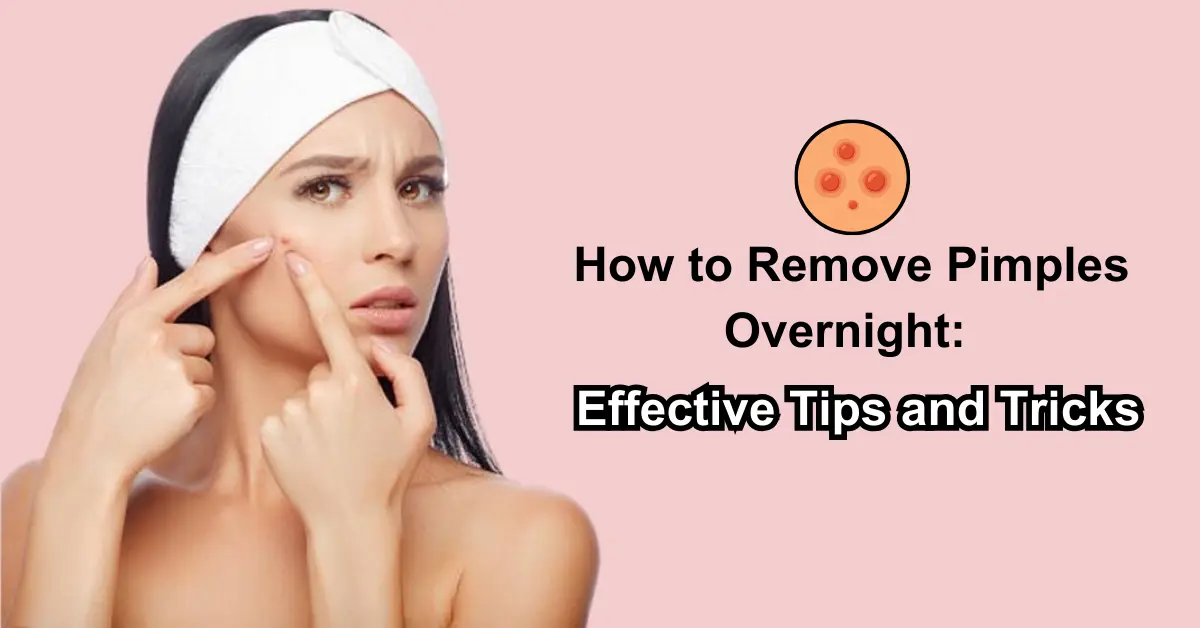
How to Remove Pimples Overnight: Effective Tips and Tricks
- 300
- 0
- 0
how to remove pimples overnight
Pimples can be a frustrating and confidence-shattering issue for many people. They seem to appear at the most inconvenient times, like before an important event or a special occasion. While it’s not always possible to get rid of pimples completely overnight, there are several methods you can try to reduce their appearance and speed up the healing process.
In this blog, we’ll share some effective tips and tricks to help you remove pimples overnight or, at least, minimize their visibility.
Understanding Pimples
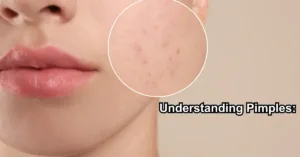
Before we dive into the remedies, it’s crucial to understand what pimples are and what causes them. Pimples, also known as acne or zits, are small, inflamed bumps on the skin that occur when hair follicles become clogged with oil, dead skin cells, and bacteria. Hormonal changes, stress, certain medications, and genetics can all contribute to the formation of pimples.
While it’s tempting to pop or squeeze pimples, it’s best to avoid doing so, as it can lead to further inflammation, scarring, and the spread of bacteria.
How to Remove Pimples Overnight (Overnight Remedies)
While it’s not possible to completely remove pimples overnight, there are steps you can take to reduce their appearance and inflammation. These include using over-the-counter acne treatments containing ingredients like benzoyl peroxide or salicylic acid, applying a spot treatment containing tea tree oil, using ice to reduce swelling, and keeping the affected area clean and moisturized. Remember, consistent skincare practices are key to managing acne effectively.
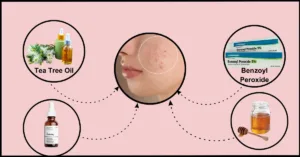
Tea Tree Oil
Tea tree oil is a natural antiseptic and anti-inflammatory agent that can be effective in treating pimples. Dilute a few drops of tea tree oil with water or a carrier oil like jojoba or coconut oil, and apply it directly to the pimple using a clean cotton swab. Leave it on overnight and rinse it off in the morning.
1. Apply diluted tea tree oil directly onto the pimple with a cotton swab.
2. Tea tree oil helps reduce inflammation and kill acne-causing bacteria.
3. Leave overnight and wash off in the morning for improved appearance.
Benzoyl Peroxide
Benzoyl peroxide is a popular over-the-counter acne treatment that helps to kill the bacteria that cause pimples and dry out excess oil. Look for a spot treatment or cream containing 2.5% to 10% benzoyl peroxide and apply it directly to the pimple before going to bed. Be cautious, as benzoyl peroxide can cause dryness and irritation in some people.
1. Benzoyl peroxide kills acne-causing bacteria, reduces inflammation, and unclogs pores.
2. Apply a thin layer directly to pimples before bed for overnight treatment.
3. Results may vary, but consistent use can lead to clearer skin.
Salicylic Acid
Salicylic acid is a beta-hydroxy acid that helps to unclog pores and dry out pimples. You can find salicylic acid in many over-the-counter acne treatments, such as spot treatments, creams, and gels. Apply a small amount directly to the pimple and leave it on overnight.
1. Salicylic acid exfoliates the skin, unclogs pores, and reduces inflammation to treat pimples effectively.
2. Apply a salicylic acid spot treatment directly on pimples before bedtime.
3. Overnight, salicylic acid works to shrink pimples and promote clearer skin by morning.
Honey
Honey has natural antibacterial and anti-inflammatory properties, making it an excellent remedy for pimples. Apply a small amount of raw, unprocessed honey directly to the pimple and leave it on overnight. Rinse it off in the morning with warm water.
1. Apply raw honey directly to pimples to reduce inflammation and promote healing overnight.
2. Honey’s antibacterial properties can help kill acne-causing bacteria and prevent future breakouts.
3. Rinse off honey in the morning for clearer skin; repeat regularly for best results.
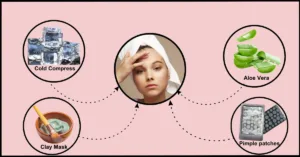
Cold Compress
Applying a cold compress to a pimple can help reduce inflammation and swelling. Wrap an ice cube or a few ice cubes in a clean cloth and hold it against the pimple for 5 to 10 minutes before going to bed. Repeat this process as needed.
1. Apply a cold compress to the pimple to reduce swelling and inflammation.
2. Hold it on the affected area for 10-15 minutes to soothe irritation.
3. Repeat several times throughout the day for best results in calming pimples overnight.
Aloe Vera
Aloe vera is known for its soothing and healing properties. It can help reduce inflammation and promote faster healing of pimples. Extract the gel from an aloe vera leaf and apply it directly to the pimple. Leave it on overnight and rinse it off in the morning.
1. Apply a thin layer of fresh aloe vera gel directly onto clean skin before bedtime.
2. Leave it on overnight to soothe inflammation and promote healing of pimples.
3. Rinse off with water in the morning and repeat nightly for best results.
Clay Mask
Clay masks can help absorb excess oil and impurities from the skin, making them an effective remedy for pimples. Look for clay masks containing bentonite, kaolin, or green clay. Apply a thin layer of the mask to the affected area, leaving it on overnight, and rinse it off in the morning.
1. Apply a clay mask on clean skin to absorb excess oil and impurities.
2. Leave the mask on for 10-15 minutes to unclog pores and reduce inflammation.
3. Rinse off gently with warm water; repeat regularly for clearer skin.
Pimple patches
These are adhesive patches that contain ingredients like hydrocolloid, which can help absorb excess oil and pus from pimples. While they may not completely remove pimples overnight, they can help reduce inflammation and promote faster healing. However, results may vary depending on the severity of the pimple. It’s important to use them as directed and continue with regular skincare practices for best results.
1. Apply pimple patch on clean, dry skin directly over pimple.
2. Patch absorbs oil and pus, reduces inflammation, promotes faster healing.
3. Leave overnight for best results; remove in the morning to see improvement.
Additional Tips:
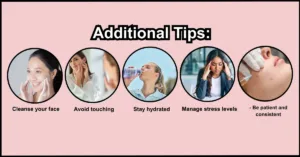
– Cleanse your face thoroughly with a gentle, non-comedogenic cleanser before applying any treatments.
– Avoid touching or picking at pimples, as this can spread bacteria and lead to further inflammation.
– Stay hydrated and eat a balanced diet rich in vitamins, minerals, and antioxidants to support healthy skin.
– Manage stress levels, as stress can trigger or worsen acne breakouts.
– Be patient and consistent with your treatment routine, as it may take some time to see visible results.
It’s important to note that while these remedies can help reduce the appearance of pimples overnight, they may not work for everyone. If you have severe or persistent acne, it’s best to consult a dermatologist for professional advice and treatment options. Remember, pimples are a common skin condition, and there’s no need to feel self-conscious or discouraged. With the right approach and a little patience, you can take control of your skin and regain your confidence.
FAQs
Q1. Can pimples really be removed overnight?
While it’s difficult to completely remove pimples overnight, you can reduce their appearance and speed up healing with proper treatment.
Q2. What natural remedies can help remove pimples overnight?
Natural remedies like tea tree oil, honey, aloe vera, and clay masks can help dry out and reduce pimples overnight.
Q3. Should I pop or squeeze a pimple to remove it?
It’s best to avoid popping or squeezing pimples, as it can lead to further inflammation, scarring, and spreading of bacteria.
Q4. What over-the-counter treatments can help remove pimples overnight?
Over-the-counter treatments containing benzoyl peroxide, salicylic acid, or spot treatments can help reduce pimples overnight when applied directly.
Q5. Are there any home remedies for reducing pimple redness overnight?
Cold compresses, aloe vera, and honey can help reduce redness and inflammation of pimples overnight when applied topically.
Also Read:
Simple Steps For How to Remove Pimples at Home in 2024
References:
https://www.ncbi.nlm.nih.gov/pmc/articles/PMC3080563/
https://www.ncbi.nlm.nih.gov/books/NBK279208/
https://www.ncbi.nlm.nih.gov/pmc/articles/PMC7020168/
Disclaimer: The information provided in this article is for informational purposes only and should not be considered medical advice. Always consult a dermatologist or healthcare professional for personalized recommendations regarding skincare and acne treatment.
Related post

7 Health Benefits of Assam Tea


